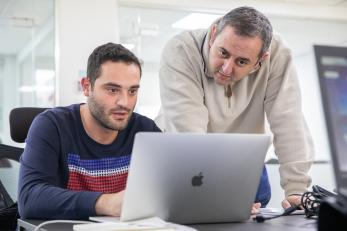Helping Jordan’s gig workers and social entrepreneurs weather COVID-19

Youth Impact Labs (YIL) is a Google.org funded (June 2017 - October 2020) US$5 million program focused on tackling youth unemployment. It operates from Jordan and Kenya, two strategic regional hubs from where it serves the Middle East and East Africa. YIL combines a systems approach that supports long-lasting change to the labor market ecosystem with a focus on identifying and testing creative, technology-enabled solutions that provide increased and improved employment opportunities. By June 2020, YIL had reached over 200,000 people, increasing net income for 8,354 vulnerable individuals by over US$4.3 million leveraging 26 private sector partnerships that launched 38 new products and services. Through their financially sustainable business models, our private sector partners expect a continued increase in their impact – in addition to improved outcomes expected through the project’s activities that focused on systemic changes to the ecosystem.
In Jordan, Mercy Corps designed YIL interventions based on an analysis of the key findings contained in research conducted during the project’s inception phase. Some of the key takeaways of the research included a youth unemployment rate of 34% and stagnant economic growth. Analysis of this and other data highlighted that job creation should be the area of focus. YIL focused on three areas: (1) improving job matching for manual laborers nationally and regionally; (2) supporting the creation of work opportunities within the gig economy through supporting and incubating digital gig economy platforms; and (3) improving the quality of existing jobs.
COVID‑19 crisis response
Few businesses and workers managed to escape the economic challenges as a result of COVID‑19 restrictions. Due to a lack of safety nets that increased their vulnerability during an economic downturn, gig economy workers were hit especially hard. Many of the start-ups supported by YIL also struggled, due to plummeting revenue and a lack of access to finance and business solutions to cover operational costs. In response to these challenges, YIL needed to develop a targeted, creative solution to aid vulnerable start-ups and workers that have been supported through the project’s social business incubator, Generation Impact. As part of its response, YIL provided technical support for social entrepreneurs to help them adjust to COVID‑19 market realities and ensure continued gig work opportunities in Jordan through 2021. In addition, YIL channelled US$19,000 in emergency cash to three Generation Impact start-up businesses that provide gig workers with income opportunities. As a result, 90 workers received income offsets to help meet immediate basic needs. The three start-ups: ViaVii, an e-tourism platform; Salalem, an ed-tech firm employing freelancers; and Utrac, a freelance delivery platform, were chosen because they showed high potential to recover, grow and continue to provide hundreds of gig workers needed income opportunities.
YIL activity sustainability plans were also put in jeopardy due to COVID‑19 related challenges. Most notably, Generation Impact, which is managed by project partner iPARK. Original sustainability plans were to hand over full operations of Generation Impact to iPARK by October 2020. However, COVID‑19 complications hindered the sustainability plan and iPARK required further financial support to sustain the incubator into 2021. As a result, iPARK collaborated with YIL to launch a fundraising campaign, to assure the survival of the incubator. YIL contributed financially to this campaign, allowing iPARK to continue hosting seven social start-ups that included businesses focused on providing refugees with home-based business opportunities.
Funding and figures
By the end of the project, YIL, in partnership with Google.org, supported the development of 23 tech innovations, including a blue-collar job matching platform, a digital platform for managing and delivering meals from home-based kitchens, an on-demand gas delivery platform, a home health care platform, a gig economy platform for machine learning, a students career counseling platform, a platform for managing human resources, a platform for managing internal training for employers, and a platform for online shopping and delivery for groceries.
YIL generated additional income for program participants of US$2,364,042. Of that total, US$516,940 were generated by women and US$97,746 by Syrian refugees. YIL created nearly 3,164 new work opportunities and reached 186,126 youth in Jordan and the Middle East. In total, YIL provided US$1,100,000 in grants to 16 grantees and an additional US$450,000 of equity investments to five startups.